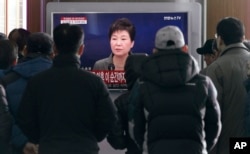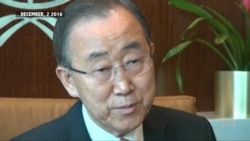South Korea's National Assembly announced Friday that the vote to impeach President Park Geun-hye had been postponed until December 9.
The president has been embroiled in a multimillion-dollar influence-peddling scandal that has decimated her image as a strong, incorruptible leader. But if Park's offer to resign earlier this week was a political ploy to upend impeachment efforts underway, as opposition lawmakers contended, it apparently worked.
For the first time in South Korean history, prosecutors named the sitting president as a subject in a criminal investigation. They claimed Park was involved in illicit acts allegedly committed by her influential friend Choi Soon-sil to force major Korean conglomerates to donate more than $65 million to two foundations. Choi was also alleged to have funneled some of the funds to her private companies and to side contracts for friends.
Frustrated opposition
Opposition leaders earlier indicated they had the two-thirds majority support needed in the 300-member National Assembly to impeach the president, and they were planning the vote for Friday.
To reach the 200-vote threshold, the two main opposition parties, the Democratic Party of Korea and the People's Party, which hold 159 seats in parliament, will need support from a number of independent legislators and disaffected members of the ruling Saenuri Party.
However, Park's offer on Tuesday to resign under certain conditions has united her party against impeachment, at least for now, and has frustrated the opposition.
"The Saenuri Party lawmakers have no intention to back the impeachment, even if we arrange the vote for December 9," said Choo Mi-ae, chairwoman of the Democratic Party of Korea.
Lawmakers from the Saenuri Party are now backing a plan to meet the conditions for her resignation set by Park — specifically, that the National Assembly first arrange for a stable transfer of power. That could include naming a new prime minister and other interim officials to run the government after she resigns and until a newly elected president is sworn in.
"For the stable transition of power and for the securing of a preparatory period for the next presidential election, all members of the ruling party unanimously made the decision," said Chung Jin-suk, the Saenuri Party leader in the National Assembly.
Park loyalists are calling for the president's voluntary resignation by the end of April and for the presidential election to be held in June.
Some Saenuri Party members who were leaning toward supporting impeachment have indicated they will reassess their positions next week after the parties debate the proposed timeline for Park's resignation.
Ban: Following the situation
In New York, U.N. Secretary-General Ban Ki-moon, who had widely been considered a top contender to replace Park before the scandal erupted, said Friday in an interview with VOA that he had been closely following the situation and watching the protesters. "I know that they are very much frustrated and angry about this lack of good governance," he said.
Watch: UN's Ban Ki-moon Says He's Following South Korea Protests
"I am sure that [the] Korean people will be able to overcome this crisis as soon as possible," he added. "I think Korea has very good, resilient and matured democratic institutions, and I only hope that they will be able to overcome with a sense of the future, a better future of their country, with the maturity of their democracy and wisdom."
Ban has not said whether he will run for president, deferring any public decision until his term as U.N. chief finishes at the end of this year.
"When I retire from this job ... then I will have to discuss this matter with the leaders of Korean society, my friends, my family," he said.
Impeachment timeline
Critics say the president is just stalling for time to finish out her single five-year term in office, which ends in early 2018.
Because of the timeline for impeachment, it could take six months or more to schedule a presidential election. The Constitutional Court would have to first review the impeachment motion, which could take up to 180 days. If the motion is approved, lawmakers would then have 60 days to schedule a new election.
However, if impeached, Park would be immediately suspended from office and the prime minister would act as the interim head of government.
The National Assembly will hold public hearings next week to question corporate leaders who were allegedly pressured by Choi to donate millions of dollars to sports and cultural foundations.
For her part, Choi has been charged with abuse of authority, coercion and attempted fraud. One of the president's aides faces similar charges, and another has been indicted for leaking government secrets to Choi, who held no official position or security clearance.
For the last five weeks, there have been massive public protests across the country demanding Park's resignation, and more are planned for this weekend.
The South Korean president's approval rating has dropped to just 4 percent, and a recent poll found that 80 percent of South Koreans supported her impeachment.
Much of the public outrage over the corruption scandal involves the perception that Choi was able to exercise "cultlike" control over Park.
Choi's father, Choi Tae-min, a religious leader, became a mentor to Park after her mother was killed during an assassination attempt on her father, Park Chung-hee, who ruled South Korea for 18 years after coming to power in a coup.
VOA's Margaret Besheer at the United Nations and Youmi Kim contributed to this report.








